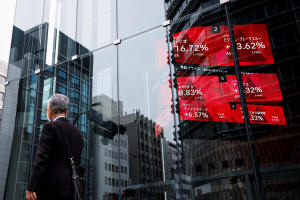Shares hit two-month low as fading Fed cut hope hammers bonds
 Send a link to a friend
Send a link to a friend
 [August 18, 2023] By
Huw Jones [August 18, 2023] By
Huw Jones
LONDON (Reuters) - Global shares hit two-month lows on Friday while U.S.
government bond yields remained near recent 16-year highs as investors
bet on interest rates staying elevated for longer, with worries over
China's shadow banking sector also a dampener.
The greenback was set for a fifth winning week, its longest winning
streak in 15 months, underpinned by the prospect of borrowing costs
remaining high or rising even further - yet with no sign of a hard
landing for the U.S. economy to crimp corporate earnings.
Crude oil was set to snap a 7-week winning streak as China's slowing
economic growth and possibility of more U.S. rate hikes hit sentiment.
The sour mood in markets extended to cryptoassets, with bitcoin hitting
a fresh two month low.
Jason Da Silva, director, global investment strategy at Arbuthnot
Latham, said stock markets were paying the price for bond yields soaring
as economic data from the United States smash expectations, despite all
the rate hikes so far.
The MSCI All Country stock index was down 0.3%, hitting its lowest since
early June after falling 5.85% during August, though it remains 10.2% up
for the year.
Ten-year U.S. Treasury yields eased 7 basis points to 4.2329%, after
surging about 30 basis points this month alone to a 10-month top of
4.3280% and near its highest levels since 2007.

Euro zone government bond yields also eased on Friday as concerns about
the global economy nudged investors into safe-haven government bonds.
Britain's 10-year bond yield had risen on Thursday to its highest since
2008 at around 4.76%.
"The bond yields are saying you are probably going to have to keep rates
higher for longer, and if growth starts to really pick up again, we
might need to tighten further and stock markets are not liking that," Da
Silva said.
Minutes from the Federal Reserve this week showed most members of the
rate-setting committee continued to see significant upside risks to
inflation, suggesting more hikes are in the pipeline.
Da Silva said that a pullback in stocks after their strong gains earlier
in the year was natural, and that investors should only be worried if
there is a recession, but this was not going to happen anytime soon in
the United States given the strong data.
The Fed and other top central banks gather for their annual confab in
Jackson Hole, Wyoming next week, with investors set to scrutinise a
speech from Fed Chair Jerome Powell on Aug. 25 for latest clues on
potential rate hikes.
Markets are already scaling back rate cuts bets next year.
S&P 500 futures and Nasdaq futures were slightly weaker.
CHINA SHADOW BANKING
Investors were keeping a close eye on the liquidity crunch that appeared
to be spreading to China's vast shadow banking sector, with Zhongzhi, a
major Chinese asset manager, telling investors it needs to restructure
its debt.
[to top of second column] |

A man walks past an electronic board
showing stock visualizations outside a brokerage, in Tokyo, Japan,
March 17, 2023. REUTERS/Androniki Christodoulou

In Asia, MSCI's broadest index of Asia-Pacific shares outside Japan
fell 0.9% to flirt with nine-month lows, bringing the total loss for
the week to over 3% and marked the third straight week of declines
for the index.
Chinese blue-chips dropped 1.2% and Hong Kong's Hang Seng Index
slumped another 2%, heading for the biggest weekly losses in two
months.
Technology shares plunged 3.6%, likely weighed by reports that
electric-vehicle batteries and other car parts are under scrutiny as
part of Washington's effort to stamp out U.S. links to forced labour
in Chinese supply chains.
Shares of Chinese property developers listed in Hong Kong fell 2%,
after China Evergrande filed for protection from creditors in a U.S.
bankruptcy court.
"At the start of the year China's economy was powering ahead. But
the picture has gradually worsened since, and now looks quite
bleak," said Jonas Goltermann, deputy chief markets economist at
Capital Economics.
Onshore yuan moved away from a nine-month trough after the central
bank set the daily fixing much higher than expected to support the
currency, with traders on edge for any more direct intervention by
Beijing or state-owned banks. [CNY/]
Japan's Nikkei also lost 0.5%, heading for a weekly drop of 3.1%.
Data on Friday showed Japan's core inflation slowed in July, a
result that is likely to support market wagers that the Bank of
Japan is in no hurry to phase out monetary easing anytime soon.
The U.S. dollar recovered from an earlier dip and was standing tall
near a two-month top at 103.42 against its major peers. It was up
about 0.5% on the week.
The Japanese yen was trading at 145.34 against the dollar, having
been hammered this week to a nine-month low of 146.56 per dollar as
yield differentials between the U.S. and Japan widened. It, however,
still neared levels that sparked an intervention by Japanese
authorities late last year.

Oil prices were marginally lower. Brent crude futures gained 0.15%
to $84.25 per barrel and U.S. West Texas Intermediate crude futures
was up 0.3% at $80.62.
The gold price was 0.2% higher at $1,892 per ounce.
(Editing by Sam Holmes, Jacqueline Wong and Toby Chopra)
[© 2023 Thomson Reuters. All rights
reserved.]
This material may not be published,
broadcast, rewritten or redistributed.
Thompson Reuters is solely responsible for this content. |